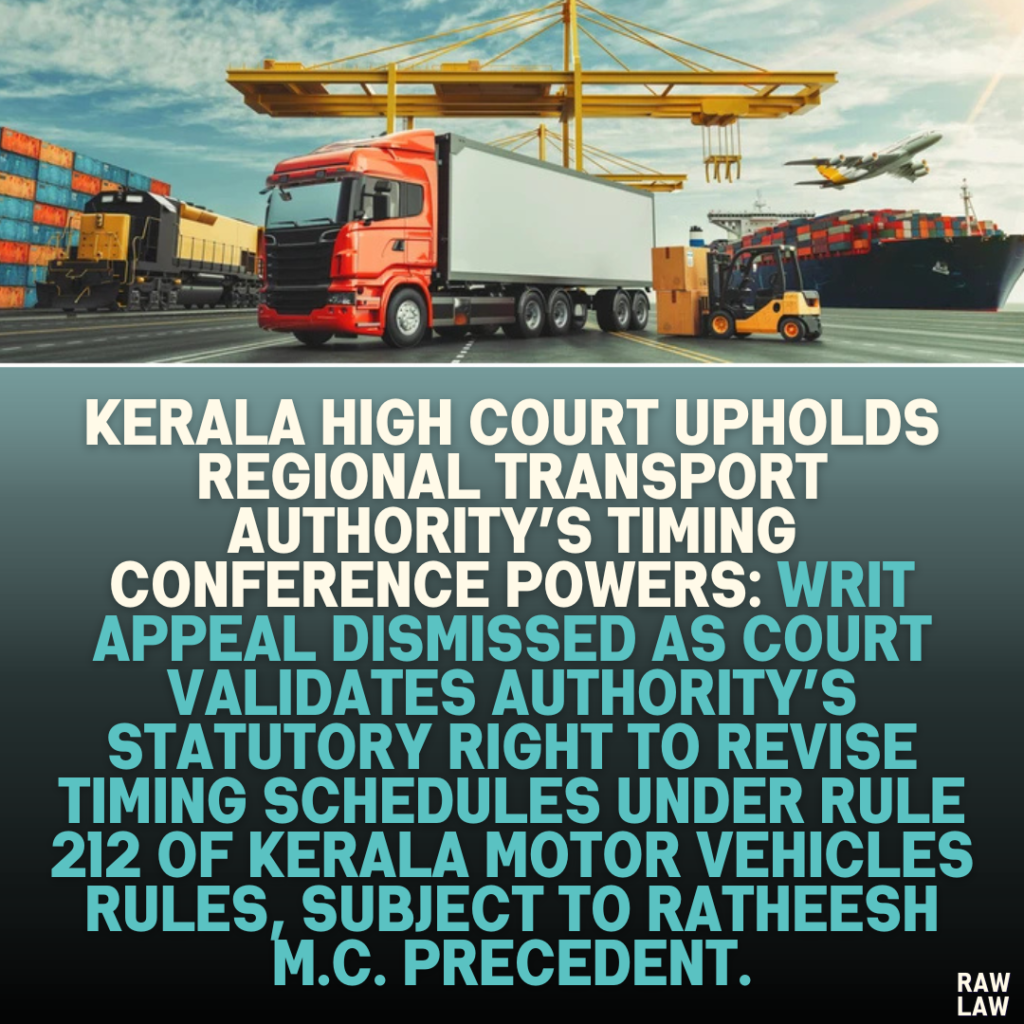Court’s Decision:
The Kerala High Court dismissed the writ appeal, holding that the first respondent (Regional Transport Authority) had the statutory authority to convene a timing conference under Rule 212 of the Kerala Motor Vehicles Rules, 1989. The court directed the respondent to ensure that the conference complies with the law and precedents, particularly Ratheesh M.C. v. Secretary, Regional Transport Authority, Thrissur. The appellant’s claim to restrain the conference was rejected.
Facts:
- The Appellant’s Service: The appellant operated a stage carriage (bus) for which timings had been settled through a court judgment dated June 5, 2024, in W.P.(C) No. 19079 of 2024.
- Challenge to Ext.P6 Notice: The Regional Transport Authority issued Ext.P6, notifying a timing conference to address objections and potentially revise the schedule. The appellant challenged this notice.
- Reliefs Sought: The appellant sought two main reliefs:
- To restrain the first respondent from revising the timings without proper authority.
- To prevent interference with the existing timing schedule unless supported by legal provisions.
Issues:
- Authority to Conduct Timing Conferences:
- Does Rule 212 authorize the Regional Transport Authority to revise already-settled timing schedules?
- Procedural Fairness:
- Did the Single Judge err in directing the appellant to raise objections at the conference instead of restraining the process altogether?
Petitioner’s Arguments:
- Lack of Opportunity: The appellant claimed that the writ petition was disposed of without providing an adequate hearing.
- No Right to Challenge: Rival operators or stakeholders allegedly had no right under Rule 212 to challenge settled timings.
- Statutory Remedy Exists: The appellant argued that any aggrieved party could use the statutory remedy under Section 90 of the Motor Vehicles Act, making the timing conference redundant.
- Illegality of Ext.P6: The notice for the timing conference was termed illegal, as no valid reasons for revising the schedule were provided.
Respondent’s Arguments:
- Authority under Rule 212: The Regional Transport Authority defended its statutory power to revise the timing schedule for stage carriages, citing Rule 212.
- Fair Hearing for All Stakeholders: The conference aimed to consider all objections, including the appellant’s, before making a decision.
Analysis of the Law:
- Rule 212 of the Kerala Motor Vehicles Rules, 1989: This rule empowers the Regional Transport Authority to prescribe and revise timing schedules for stage carriages to ensure efficient and fair operation.
- Section 90 of the Motor Vehicles Act, 1988: Provides a statutory remedy for grievances regarding timing decisions but does not preclude the authority’s power to revise timings.
- Precedents:
- Ratheesh M.C. v. Secretary, Regional Transport Authority, Thrissur [2015 (1) KLT 69]: Established that timing revisions must adhere to statutory provisions and ensure procedural fairness.
Precedent Analysis:
In Ratheesh M.C., the Kerala High Court clarified that timing conferences must follow due procedure, and the Regional Transport Authority has the discretion to revise schedules. This precedent supported the court’s finding that the timing conference in the present case was not beyond the authority of the respondent.
Court’s Reasoning:
- Statutory Authority:
- The court affirmed that Rule 212 provides the Regional Transport Authority the power to revise timing schedules.
- The first respondent’s decision to schedule a timing conference was consistent with its statutory authority.
- Procedural Safeguards:
- The direction to consider the appellant’s objections, along with those of others, ensured procedural fairness.
- The timing conference would allow all stakeholders to present their views before a final decision is made.
- No Immediate Harm:
- The timing conference itself did not prejudice the appellant’s rights, as no decision had been made yet.
- Rejection of Appellant’s Contentions:
- The appellant’s claim that rival operators could not challenge his schedule was dismissed, as Rule 212 does not restrict objections from other stakeholders.
Conclusion:
The court upheld the judgment of the learned Single Judge, dismissing the writ appeal. It directed the first respondent to:
- Convene the timing conference as scheduled.
- Ensure compliance with Rule 212 and judicial precedents, particularly Ratheesh M.C..
The court emphasized that the appellant’s objections would be considered fairly, along with others, during the conference.
Implications:
- Reaffirmation of Authority: This judgment confirms the Regional Transport Authority’s power to revise timing schedules under Rule 212.
- Procedural Fairness: It underscores the need for procedural safeguards during timing revisions, ensuring that all stakeholders’ objections are considered.
- Guidance for Future Cases: The decision provides clarity on the application of Rule 212 and reinforces the binding nature of judicial precedents like Ratheesh M.C..




Pingback: Bombay High Court Directs State to Release ₹4.79 Crores Subsidy to Petitioner, Holds "Denial of Subsidy Violates Article 14; State Must Adhere to Assurances Under GR Dated 31st July 2018," Rejects Procedural and Double Benefit Objections - Raw
Pingback: Bombay High Court Upholds Estate Officer’s Jurisdiction in Eviction Proceedings Under Public Premises Act, Clarifies Inapplicability of Rent Control Protections to Government-Owned Land: “Public Premises Act Overrides Rent Control Acts for Government